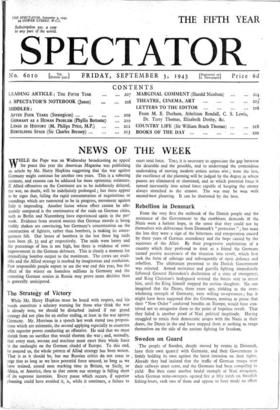The Strategy of Victory
While Mr. Harry Hopkins must be heard with respect, and his words constitute a salutary warning for those who think the war is already won, we should be disturbed indeed if our grand strategy did not plan for an earlier ending, at least in the war against Germany. Mr. Morrison in a speech last week stated two proposi- tions which are axiomatic, the second applying especially to countries with superior power conducting an offensive. He said that we must shrink from no sacrifice that would shorten the war ; and, secondly, that every man, woman and machine must exert their whole force in the onslaught on the German citadel of Europe. To this end, he assured us, the whole pattern of Allied strategy has been woven. That is as it should be, but our Russian critics do not cease to urge that as long as ,we have potential force unused, so long as we have trained, armed men marking time in Britain, or Sicily, or Africa, or America, then to that extent our strategy is falling short of its supreme intention. Every pause which occurs, if superior planning could have avoided it, is, while it continues, a failure to
exert total force. True, it is necessary to appreciate the gap between the desirable and the possible, and to understnd the tremendous undertaking of moving modern armies across as ; none the less, the excellence of the planning will be judged by the degree in whicn pauses are eliminated or shortened, and in which potential force is turned incessantly into actual force capable of keeping the enemy always stretched to the utmost. The war may be won with second-best planning. It can be shortened by the best.


























